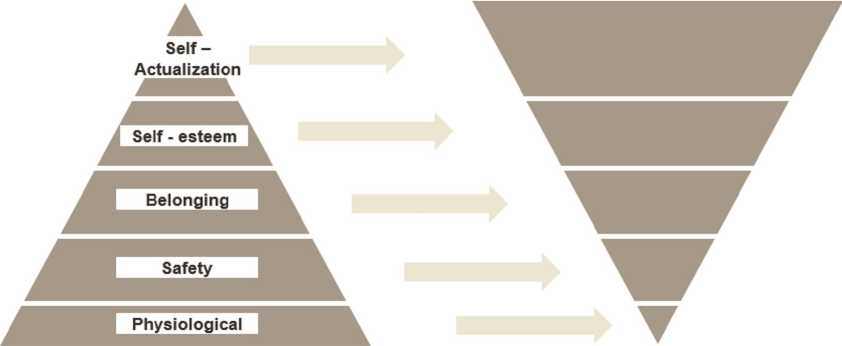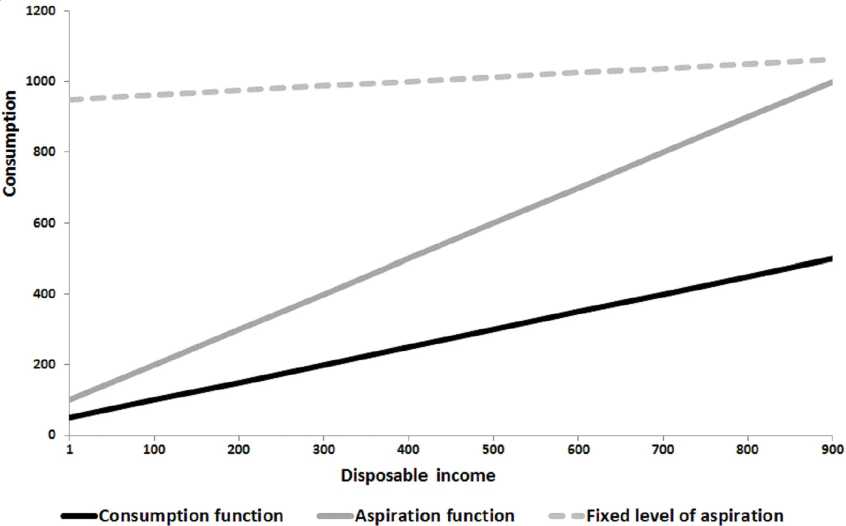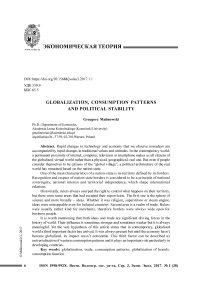Globalization, consumption patterns and political stability
Автор: Malinowski Grzegorz
Журнал: Вестник Волгоградского государственного университета. Экономика @ges-jvolsu
Рубрика: Экономическая теория
Статья в выпуске: 1 (38), 2017 года.
Бесплатный доступ
Rapid changes in technology and economy that we observe nowadays are accompanied by rapid changes in traditional values and attitudes. In the contemporary world, a permanent proximity of internet, computer, television or smartphone makes us all citizens of the globalised, virtual world rather than a physical, geographical, real one. But even if people consider themselves to be citizens of the “global village”, a political architecture of the real world has remained based on the nation-state. One of the main characteristics of a nation-state is its territory defined by its borders. Recognition and respect of nation-state borders is considered to be a principle of national sovereignty, national interest and territorial independence, which shape international relations. Historically, rulers always usurped the right to control what happens on their territory, but there were some areas that had escaped their supervision. The first one is the sphere of science and more broadly - ideas. Whether it was religion, superstition or steam engine, ideas were unstoppable even for isolated countries. Second area is a realm of trade. Rulers were usually rather kind for merchants, therefore borders were always wide open for business people. It is worth mentioning that both ideas and trade are significant driving forces in the history of world. Their influence is sometimes stronger and sometimes weaker but it is always meaningful. Yet the very hypothesis of this article states that in contemporary, globalised world a third important factor has arrived. It was always present but until the economy hasn’t become globalized, its impact wasn’t noticeable. This third factor can be described as universalisation of western consumption patterns and it plays an important role particularly in developing countries.
Globalisation, trade, consumption patterns, globalisation of brands, consumption function
Короткий адрес: https://sciup.org/14971212
IDR: 14971212 | УДК: 339.9 | DOI: 10.15688/jvolsu3.2017.1.1
Текст научной статьи Globalization, consumption patterns and political stability
DOI:
Globalisation and consumption patterns
There is no country and no socioeconomic system that operates in a vacuum. Such actors as geography, climate, culture or neighbour countries play a significant role in its overall performance. On the top of that is an increasingly important factor - globalisation. By globalisation I understand a historical and spontaneous process of liberalization, along with the accompanying, systematic integration into a single, independent global market in goods, capital, technology, information, and – belatedly and on a smaller scale – labour, which previously constituted markets that were isolated or bound by loose functional ties [2]. It is particularly important to note, that from the perspective of socioeconomic cohesion, globalisation simultaneously influences directly or indirectly such entities as state, society and the market.
But how specifically globalisation affects the functioning of socioeconomic system? In order to answer this question I suggest to look at the process of globalisation from one particular side, which is consumption patterns. One of the possible approaches to globalisation is to treat it as a process of promoting consumption patterns of rich countries. World order is often characterised as an equilibrium state between independent territorial entities – countries, but due to a contemporary advances in global trade, technology and even thanks to international social networking media, steady frontiers between countries are disappearing [1]. Such a situation favors a gradual harmonization of customer needs worldwide. This very harmonization is dominated by western products and reflects western lifestyle which may be described as western consumption patterns.
What are the main characteristic of consumption patterns in rich countries? First characteristic is the structure of household spending. In rich countries households spend relatively less on basic needs. Considering Maslow’s pyramid of needs, consumption patterns in rich countries may be described by stating, that the pyramid (structure) of spending is the inverse of the pyramid of needs (see Fig. 1) [6]. Frankly speaking, people spend relatively more money on culture, education and entertainment than on food or housing. This regularity is reflected in statistical data. It turns out that in Germany households spend 9 % of their income on food and beverages, while Poles on the same purpose spend 20 % of their income and Hindus – 50 %. The pattern is straightforward: the richer the country, the more people spend on higher needs. And when a certain country gets richer, then simultaneously spending on basic needs decrease.
Second characteristic is about globalisation of brands. Nowadays it is striking, that consumer’s needs have been unified all over the world by creating products with a global reach. Or to put it in a different way, the differences in consumption patterns between countries keep diminishing [4]. As a confirmation of this statement one may use numerous rankings from different countries presenting the most popular companies and brands. It doesn’t matter whether a particular benchmark is launched in Poland,
Hierarchy of needs Structure of spending in rich countries

Fig. 1. Pyramid of needs vs Pyramid of spending in rich countries
Germany or India; Apple, Google and CocaCola are still the most powerful brands. It is worth mentioning that it’s not only popularity but also desire. Because of globalisation in general, and because of media and advertising in particular, all people, even in distant countries have got the same desires. For instance according to the Next Mobile Frontier Report [1 0] when it comes to smartphones, respondents from Nigeria, Brazil, India, China and Vietnam would like to purchase either I-phone or Samsung because this is a brand they aspire to. The very same pattern applies to most of products of everyday use. Therefore the world is facing a unification of needs with a simultaneous materialisation of these needs in a form of specific brands and products. This process is quick, it doesn’t encounter any resistance and from the perspective of economics, it poses all features of monopoly.
Unification of consumption patterns – consequences
At this point however a crucial question arises. What happens when an underdeveloped (or at least developing) country adopts consumption patterns that are similar to those in rich countries? In other words, what happens, when not so wealthy people want to purchase the same stuff as citizens of rich countries?
First consequence is that, in an underdeveloped country the needs are growing faster than the ability to satisfy them [3]. It is commonly known, that there is a positive correlation between disposable income and the level of consumption. In economics this relationship is represented by consumption function. Same reasoning may be applied in order to construct an “aspiration function” – function that depicts the relationship between disposable income and the level of aspiration, which can be defined as desired, but realistic consumption level. At the “normal” level, by which I understand lack of prevalence of consumption patterns from rich countries, an aspiration function is parallel to consumption function (see Fig. 2). However, as mentioned before, I suggest that contemporary an additional phenomena plays an important role. In underdeveloped countries, due to increase in disposable income from one side and due to the popularity of consumption patterns imported from rich countries, needs grow faster than the ability to satisfy them which may be described as aspiration function been detached from economic reality of a country. A desired consumption level is being fixed at the level determined by rich

Fig. 2. Consumption function, aspiration function and a fixed level of aspiration
countries and I assume it is beyond the reach of underdeveloped countries. It becomes a benchmark that everybody want to achieve. However for most of the developing countries it is not possible at least in the predictable future.
Frankly speaking, importing consumption patterns from rich countries creates the situation where people in Nigeria or India, with monthly wage not exceeding 300 $ wish to buy the same smartphones as Germans do (in this case however, average monthly wage exceeds 2500 $). Considering the fact that the cost of the smartphone is around 700 $, comparison between purchasing power of different nations is meaningful.
In certain parts of the world, because of unmet needs, frustration arises. It is particularly important today, because of the prevalence of media industry. A hundred or two hundred years ago people from different parts of the world were also willing to achieve the western standard of living. However an average person from the past, who was living in an underdeveloped country probably had no idea of western standard of living, and was not able to compare his / her situation with the situation of an average German or French. Today, because of Internet and television, it is not a problem for people from Chad or India to compare themselves with rich countries. Comparison of wages, comparison of unmet need rises frustration [9].
Under such circumstances, there is a growing pressure on the government to “do something” to change situation as fast as possible. However from the macroeconomic perspective, substantial changes require time, even decades in order to shorten the distance to the rich countries. But in many cases governments are not being given enough time, discontent arises even when the economy is growing. Besides, in many cases, such a situation leads to radical government decisions which turn against country’s economy. To some extent, Poland is an example of how this mechanism works in practice. Becoming EU member and experiencing a durable economic growth has risen the aspirations of Poles. From their perspective, a comparison between their situation and the material status of Swedes, British or German started to be more common than comparisons to the situation of Slovaks, Lithuanians or Bulgarians. And although high aspirations are considered to be rather good, such comparisons were rather frustrating than motivating. As a result, a new government was elected, with completely different vision of Poland and with rather populist characteristics.
The growth of impatience and dissatisfaction is accompanied by an increase of economic migration or at least increase of desire to emigrate [8]. There are numerous statistic reports supporting this hypothesis, and we can expect global migration to increase in the future. History tells, that people always move from territory with poor development opportunities to richer surroundings. Nowadays, this tendency may become even stronger than it was in the past, because people know the material status of rich nations and because the very process of removal is, in general, much safer than it was in previous centuries.
Conclusions
Recently a lot of research has been done in the area of income inequalities and equality of opportunity. Most of these studies represent a national perspective which means, that their main goal is to indicate certain implications of (for instance) high economic inequalities in a particular country. Such an approach is not adequate, especially in case of developing countries. The reason to this is globalisation. Globalisation has been changing the reference point of individuals. People no longer compare themselves only with their neighbours and compatriots but more frequently they compare themselves with rich nations or with individuals, who moved to rich countries. Therefore not local, regional or national but global inequalities are becoming more and more important from the perspective of research adequacy. This observation is not only important on the theoretical level. Also politicians and economists whenever they try to maximize the level of equality of opportunities must consider the fact, that equality of opportunity is becoming more and more difficult to maximize, because a traditional reference point – a nation state is being replaced by a new one, which is a fixed level of consumption that is determined by patterns imported from rich countries via media industry. And at this point the government has no instruments to change this state of affairs.
But as far as I know, there are two options to mitigate that phenomena. The first one is the example of rich countries with high income inequalities, like the USA. Discontent caused by a high level of inequality is to some extent mitigated by myths and legends widespread in a country [5]. For instance the myth of “American dream” makes people believe that everyone living in the United States has got the same level of opportunity. It doesn’t matter that the very concept of the “American dream” was refuted in a numerous studies, the persistence of this idea is puzzling [11]. So if a comparable myth or idea is popular in a certain nation, there is probably no need to be afraid of fixed level of aspiration.
Second option is limited and it has all to do with social needs. There is a growing necessity to drop them. Obtaining such an outcome is difficult and cannot be done immediately. But by reducing the reach of advertising industry, the uncontrolled growth of needs may be restrained. A good example of such policy may be found in Scandinavian television, where advertising during children’s programs was banned.
Government’s efforts towards inequality reduction may be considered a potential cure for problems caused by fixed level of aspiration. However this would probably not be an effective solution, because reducing inequalities in one country doesn’t change the situation at all. Only a substantial reduction of global inequalities [7] may bring us closer to solving this problem.
The very fact, that due to globalisation and unification of western consumption patterns most of individuals worldwide have got the same aspirations may be distorting from the perspective of world order. Country frontiers steadily disappear or they are simply ignored by ideas, business and technology – factors that on their own have created a virtual reality that is increasingly becoming more real than a physical reality of international arrangements. In these conditions, the governance becomes to be more and more difficult. Even a successful government with pragmatic policy that improves the living conditions of citizens may be perceived as inefficient, because in a world of universal consumption patterns, the needs grow faster than the ability to satisfy them. This creates a dangerous potential for a growing social discontent and a simultaneous populistic response of the governments in developing countries.
For the time being, the influence of consumption patterns being set at the fixed level should be carefully studied empirically, especially from the perspective of its influence on the political stability of the country.
Список литературы Globalization, consumption patterns and political stability
- Kissinger H. World Order. New York, Penguin Books, 2015. 432 p.
- Kołodko G.W. Truth, Errors, and Lies. Politics and Economics in a Volatile World. New York, Columbia University Press, 2011. 460 p.
- Kołodko G.W. Whither the World: The Political Economy of the Future. Houndmills, Basingstoke, Hampshire, Palgrave Macmillan, 2014. 223 p.
- Konya I., Ohashi H. Globalization and Consumption Patterns among the OECD Countries. Boston College Working Papers in Economics, 2004. Available at: http://ideas.repec.org/p/boc/bocoec/596.html.
- Malinowski G. Percepcja nierówności społecznych a rzeczywistość. Nierówności Społeczne a Wzrost Gospodarczy, 2014, no. 2 (38), pp. 118-136.
- Maslow A. Motivation and Personality. New York, Harper publishing, 1954. 395 p.
- Milanovic B. Worlds Apart. New Jersey, Princeton University Press, 2005. 240 p.
- Milanovic B. The Haves and the Have-Nots. New York, Basic-Books, 2011. 259 p.
- Skidelsky R., Skidelsky E. How Much is Enough? Money and the Good Life. London, Penguin Books, 2012. 272 p.
- The Next Mobile Frontier Report -Upstream 2014. Available at: http://www.upstreamsystems.com/2014-next-mobile-frontier-report/zdn.
- Wilkinson R., Pickett K. Duch równości. Wydawnictwo Czarna Owca. Warszawa, 2011. 312 p.


